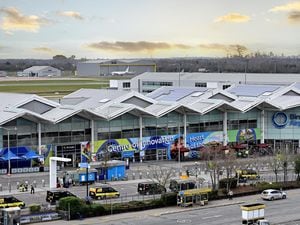'Simply not good enough': Home Secretary Theresa May attacks lack of ethnic minorities in police during Birmingham speech
Theresa May has attacked the lack of black and minority ethnic officers and women in the police service, describing the situation at some forces as "simply not good enough".
In a speech to members of the National Black Police Association, the Home Secretary said "diversity profiles" covering England and Wales showed no force has a black and minority ethnic representation reflecting its local population, while four forces have no black officers.
Mrs May told the association's annual conference in Birmingham: "These profiles, based on self-declared ethnicity data supplied by forces, give breakdowns for officers in each force by gender and ethnicity, compared against the local population.
"They reveal a hard truth - that no force has BME representation that matches its local demographic.
"Incredibly, this data shows that four forces do not employ any black or black British police officers at all, and female officers make up 28% of all police officers but 51% of the total population.
"This comes on top of existing statistics showing that there are only two chief officers who self-identify as BME in England and Wales, and 11 forces with no BME officers above even the rank of chief inspector."
The Home Secretary said she hoped the figures would act as a "wake-up call" to forces and provide chief constables with the information they need to identify areas for improvement, as well as for elected police and crime commissioners to hold them to account.
The four forces with no black officers as at March 31, according to self-declared data submitted to the Home Office, have been identified as Cheshire, Durham, North Yorkshire and Dyfed-Powys.
During her speech, the first by a Home Secretary to the NBPA's conference since 2003, Mrs May slapped down Britain's most senior police officer in a row over the use of stop and search powers.
Claims that knife crime is rising as a result of curbs on the policing method are "simply not true", the Home Secretary said.
The comments put her publicly at loggerheads with Metropolitan Police commissioner Sir Bernard Hogan-Howe, who earlier this year suggested the reforms were behind a dramatic increase in knife crime in London.
Mrs May told the NBPA conference: "I don't need to tell anyone here that properly conducted stop and search is an important police power - and I will always back police officers who use their powers legitimately and accountably.
"But when stop and search is misapplied, and when people are stopped and searched for no good reason, it is unfair, it wastes valuable police time, and it damages the relationship between communities and the police.
"It is simply not right for people to be stopped and searched again and again because of the colour of their skin.
"I know there are those who say that our reforms have gone too far, that the pendulum has swung too much the other way, and that reforms to stop and search are linked to knife crime in our capital and elsewhere.
"But to them I say this: stop and search reform has worked, it must continue, and - if you look at the evidence - it shows no link whatsoever with violent crime."
The number of stop and search-related complaints recorded by the Independent Police Complaints Commission have fallen by a fifth in the last two years, Mrs May said, but progress on the issue would be of little comfort to those who are stopped unfairly.
The minister added: "When you look at the evidence, when you look at places like London where stop and searches have fallen the most, you see that in fact that reduction has nothing to do with knife crime.
"It is simply not true that knife crime is rising because the police are no longer stopping and searching those carrying knives."
Mrs May said some initiatives were helping the fight to improve diversity levels, including a London residency criteria for new recruits to the Metropolitan Police which had yielded outstanding results.
Praising the Greater Manchester, Nottinghamshire, Thames Valley and West Midlands forces for taking positive action on the issue, Mrs May added: "Every officer in this country from the newest recruit to the Commissioner of the Metropolitan Police knows that in this country, we believe in policing by consent.
"And if we are to protect that principle, we must not only improve public trust and confidence in the police, but we must ensure that police forces properly reflect the communities they serve."
The West Midlands' police and crime commissioner, David Jamieson, welcomed the decision to publish the diversity data.
"I have constantly said that West Midlands Police needs to look like the West Midlands," he told the conference.
"We are making progress in the West Midlands," Mr Jamieson said.
But he warned that cuts to police budgets could hamper work to make forces more representative of local communities.
"Underlying all of this is the issue of resources and austerity," he said. "Progress is being made, but the pace will not quicken until we are able to recruit significant numbers into our forces."
Shadow police minister Jack Dromey said: "It is right that the police must look like the people they serve if they are to gain the trust and support of communities.
"However, many forces in the UK have already said that under the severe cuts proposed by the Tories they will not be able to recruit until 2019 at the earliest.
"The police must act, but it is extremely difficult for forces to improve diversity and to carry on protecting communities whilst the Tories continue on their mission to slash police funding and hollow out the police service."
Metropolitan Police assistant commissioner Helen King disputed Home Secretary Theresa May's figures about the career prospects of black and minority ethnic officers.
On progression to senior ranks, she told BBC Radio 4's World at One: "That's an area where we do a lot of work supporting officers.
"I think the figures that have been quoted nationally today are wrong, in that I know within London I work with at least four chief officer colleagues who are from black and minority ethnic backgrounds."
Asked if Mrs May got her figures wrong Ms King said: "Certainly, from my experience, they are not correct.
"Of the 32 boroughs of London, five of them are led by black or minority ethnic chief superintendents and they are fantastic role models to officers coming in through the ranks."





